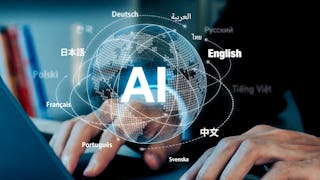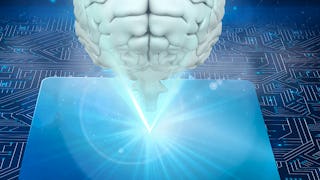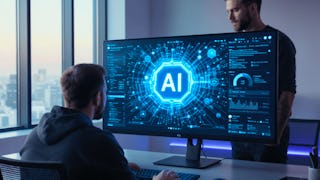NVIDIA: Fundamentals of NLP and Transformers Course is the third course of the Exam Prep (NCA-GENL): NVIDIA-Certified Generative AI LLMs - Associate Specialization. This course provides learners with foundational knowledge of Natural Language Processing (NLP) and practical skills for working with NLP pipelines and transformer models. It combines theoretical concepts with hands-on exercises to prepare learners for real-world NLP applications.


NVIDIA: Fundamentals of NLP and Transformers
This course is part of Exam Prep (NCA-GENL): NVIDIA-Certified Generative AI LLMs Specialization

Instructor: Whizlabs Instructor
Included with
Recommended experience
What you'll learn
Understand NLP fundamentals, key tasks, and real-world applications.
Implement NLP techniques, including tokenization, word embeddings, and sequence models.
Explore transformer architecture, self-attention mechanisms, and encoder-decoder models.
Skills you'll gain
Details to know

Add to your LinkedIn profile
4 assignments
See how employees at top companies are mastering in-demand skills

Build your subject-matter expertise
- Learn new concepts from industry experts
- Gain a foundational understanding of a subject or tool
- Develop job-relevant skills with hands-on projects
- Earn a shareable career certificate

There are 2 modules in this course
Welcome to Week 1 of the NVIDIA: Fundamentals of NLP and Transformers course. This week, we'll cover the basics of NLP, starting with its importance and key tasks. You'll learn about Tokenization, Text Preprocessing, and the challenges of working with text data. We'll also walk through constructing an NLP pipeline, with a demo on NLP Pipeline Classification using a flight dataset, including model fitting and evaluation. Lastly, we'll explore Word Embeddings and compare CBOW and Skipgram. By the end of the week, you'll have a strong foundation in NLP concepts and techniques.
What's included
10 videos2 readings2 assignments1 discussion prompt
Welcome to Week 2 of the NVIDIA: Fundamentals of NLP and Transformers course. This week, we’ll cover the basics of sequence models, starting with an introduction to RNNs and the challenges of Vanishing and Exploding Gradients. We’ll explore LSTM and GRU architectures and their role in improving RNNs. Next, we’ll dive into Transformers in NLP, focusing on key features of Transformer architecture, Positional Encoding, Self-Attention, and Multi-Head Attention. Finally, we’ll discuss the Encoder-Decoder architecture and different types of Transformer models. By the end of this week, you’ll have a solid understanding of sequence models and Transformers.
What's included
11 videos3 readings2 assignments
Earn a career certificate
Add this credential to your LinkedIn profile, resume, or CV. Share it on social media and in your performance review.
Instructor

Offered by
Explore more from Software Development
 Status: Free Trial
Status: Free Trial Status: Free Trial
Status: Free Trial Status: Free Trial
Status: Free Trial Status: Preview
Status: PreviewBoard Infinity
Why people choose Coursera for their career





Open new doors with Coursera Plus
Unlimited access to 10,000+ world-class courses, hands-on projects, and job-ready certificate programs - all included in your subscription
Advance your career with an online degree
Earn a degree from world-class universities - 100% online
Join over 3,400 global companies that choose Coursera for Business
Upskill your employees to excel in the digital economy
Frequently asked questions
To access the course materials, assignments and to earn a Certificate, you will need to purchase the Certificate experience when you enroll in a course. You can try a Free Trial instead, or apply for Financial Aid. The course may offer 'Full Course, No Certificate' instead. This option lets you see all course materials, submit required assessments, and get a final grade. This also means that you will not be able to purchase a Certificate experience.
When you enroll in the course, you get access to all of the courses in the Specialization, and you earn a certificate when you complete the work. Your electronic Certificate will be added to your Accomplishments page - from there, you can print your Certificate or add it to your LinkedIn profile.
Yes. In select learning programs, you can apply for financial aid or a scholarship if you can’t afford the enrollment fee. If fin aid or scholarship is available for your learning program selection, you’ll find a link to apply on the description page.
More questions
Financial aid available,

